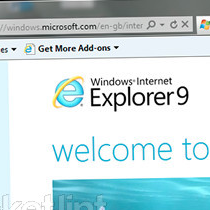Microsoft released IE9 into the big bad world on 14 March, but already the browser has come under pressure from consumer rights guru Which, who accuses the anti-tracking tool built into the browser of being flawed.
The problem seems to occur because IE9 uses multiple Tracking Protection Lists (TPLs). A study from Stanford University warns that, when users decided to use more than one TPL (Microsoft offers users five), the rules set (for allow or deny) became conflicted, with the allow overruling any deny. In short this means some lists allow trackers that other do not.
Jonathan Mayer, lead researcher on Stanford University’s Do Not Track project said the findings by Which? Computing could leave IE9 users open to being tracked:
"The issue here is that if a user installs TPLs that have ‘allows’ for web content that should be blocked, they leave themselves vulnerable to being tracked," he said.
"The user has to decide which list to trust and get it right. I would urge users to think twice before installing a list, and to consider who it is they trust to compile a list that protects them, and to trust they keep updating the list. My concern with TPLs is that users shouldn’t have to know the difference between a ‘block’ and an ‘allow’ rule. They should just be able to opt out."
In the highly competitive world of web browsers, Microsoft can ill-afford any negative press with regards to its new platform.
And, with much of the criticism of earlier Internet Explorer versions centred around its lack of security, the fact that a tool designed to make surfers more secure is apparently not doing its job is the last thing that Redmond bosses would have wanted.
Have you tried IE9 yet? If so, what do you think of the new browser? Give us your thoughts using the comments below.

